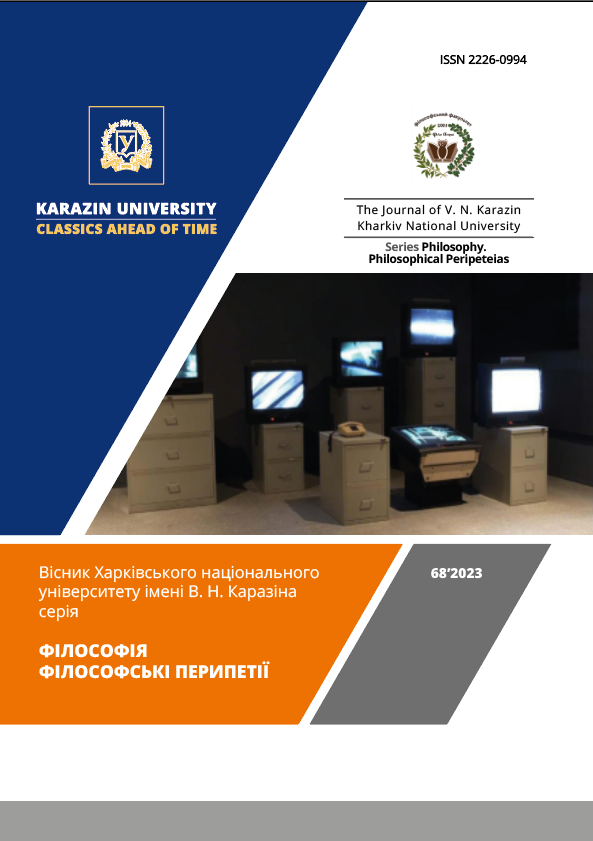INFORMATION SOCIETY AND NEW GLOBAL ETHICS
Abstract
The article is dedicated to analyzing socio-cultural and ethical changes occurring in the modern information society under the influence of globalization processes. The main aim of the research is to analyze cultural transformations in the sphere of information society ethics. In examining these changes, the authors utilize theoretical concepts from leading researchers in the field of information society and ethics, including D. Bell, J. Baudrillard, M. Castells, R. Florida, at al.
The article focuses on changes not only oriented towards technological aspects and the proliferation of information but also on the complex aspects of human interaction: the ability to create and transmit ethical values from generation to generation while considering existential priorities and moral norms.
The authors regard the information society as a new socio-cultural reality that necessitates the development of a new global ethics. Such an ethics should take into account the global experience in the realm of morality and the necessity for democratizing the information society.
The main emphasis of the article is directed towards interactive, networked communication as a key element of interaction, diverse forms of social dialogue, and methods of democratizing social relations through new technologies. In this context, the authors highlight the significance of Generation Z as a new creative class within the information society, serving as a subject of global ethics. This generation possesses new communicative skills and the ability to propose new strategies and forms of ethical behavior to adapt within the changing information society.
In the conclusions of the article, the authors underscore that a new global ethics requires norms capable of aligning national, particular values with global universal ethical values, including ecological, humanistic, and human-centered values, ensuring their accessibility through the democratization of the information society. The methodological basis for such ethics could be Kantianism, fostering the harmonization of intergenerational interactions in the context of information society development.
Downloads
References
Bauman, Z. (2013). Liquid modernity. John Wiley & Sons. (In English)
Bauman, Z. (2013). The individualized society. John Wiley & Sons. (In English).
Beck, U. (1992). Society of risk: on the way to another Modern. (Theory, Culture & Society Series). Sage Publication. (In English).
Beck, U. (2005). Power in the global age: A new global political economy. Polity. (In English).
Bell, D. (2020). Post-industrial society. In The information society reader (pp. 86-102). Routledge. (In English).
Bronnimann, A. (2017). Generation Z: Independent Study; Executive Summary. Montreux: Swiss Education Group. (In English).
Castells, M. (2002). The Internet galaxy: Reflections on the Internet, business, and society. Oxford University Press, USA. (In English).
Florida, R. (2002). The rise of the creative class. New York: Basic books. (In English).
Giddens, E. (2004). Unrestrained world. How globalization is transforming our lives. Kyiv: Alterpress. (In Ukrainian).
Kant, I. (2006). Kant: anthropology from a pragmatic point of view. Cambridge University Press. (In English).
Shapoval, V. M., & Tolstov, I. V. (2021). Quo Vadis: anthropological dimension of the modern civilization crisis. (In English).
Strauss, W., & Howe, N. (2009). The fourth turning: What the cycles of history tell us about America's next rendezvous with destiny. Crown. (In English).
Copyright (c) 2023 Іван Толстов, Вадим Даніл’ян

This work is licensed under a Creative Commons Attribution 4.0 International License.
Authors who publish with this journal agree to the following terms:
- Authors retain copyright and grant the journal right of first publication of this work under the terms of a license Creative Commons Attribution License 4.0 International (CC BY 4.0).
- Authors are able to enter into separate, additional contractual arrangements for the non-exclusive distribution of the journal's published version of the work (e.g., post it to an institutional repository or publish it in a book), with an acknowledgement of its initial publication in this journal.
- Authors are permitted and encouraged to post their work online (e.g., in institutional repositories or on their website) prior to and during the submission process, as it can lead to productive exchanges, as well as earlier and greater citation of published work.






3.gif)




